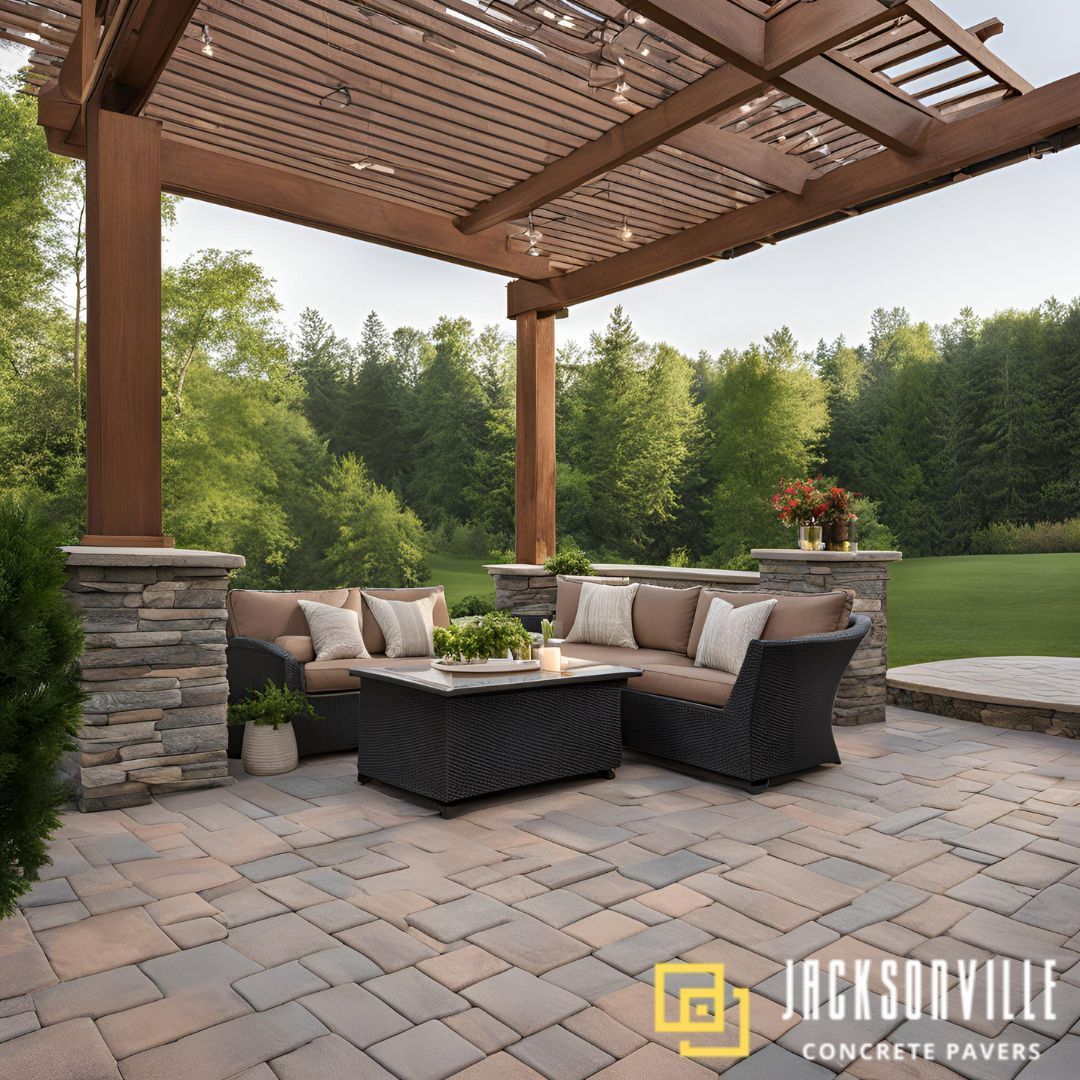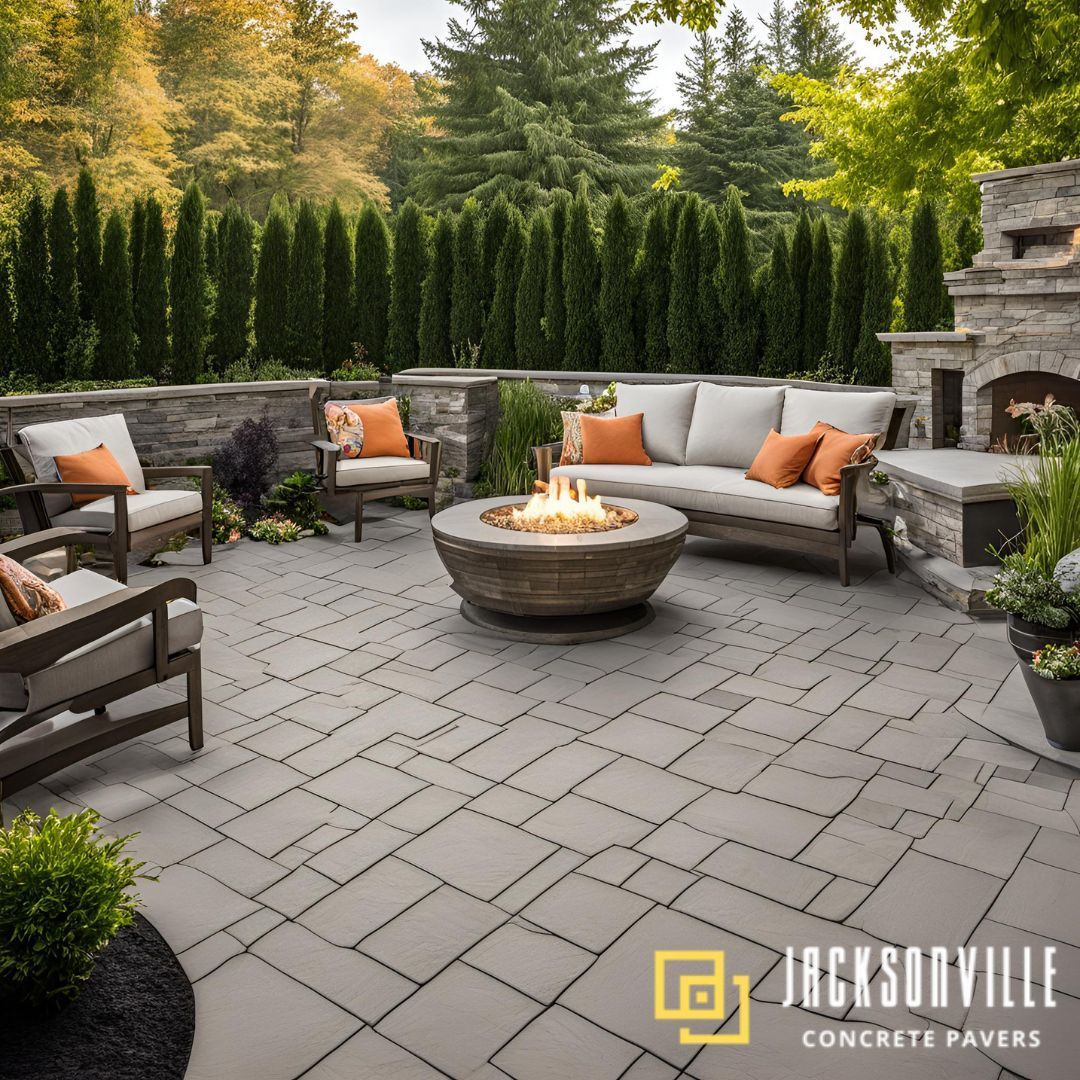Types and Benefits of A Concrete Pool Patio For Your Outdoor Space
Are you looking to transform your backyard oasis into a luxurious retreat with a concrete pool patio? Look no further. With a variety of styles, textures, and an array of an array of colors to choose from, a concrete pool patio can enhance the beauty of your pool area while providing durability and low maintenance. Whether you prefer a modern squared edge or a rounded 'bullnose' edge, Jacksonville Concrete Pavers can bring your dream backyard getaway to life.
With options to mimic the look of wood, brick, or natural stone, stamped concrete can give you the aesthetic you desire at a more affordable cost. Say goodbye to the hassle of rot and refinishing and say hello to a durable and beautiful concrete pool patio that will stand the test of time. Let us help you create the perfect outdoor living space for relaxation and entertainment.
Types of Concrete for Pool Patios
Concrete is a popular and versatile option that offers a wide range of design possibilities. However, not all concrete is the same. There are different types of concrete that you can use for your pool patio, each with its unique characteristics. Let's explore some of the most common types:
Stamped Concrete
Stamped concrete is a popular choice for pool patios due to its versatility and aesthetic appeal. It involves pressing patterns and textures into wet concrete to mimic the look of other materials such as stone, brick, or wood. With stamped concrete, you can create the illusion of a more expensive patio surface without the high cost. It also offers excellent slip resistance and is easy to maintain.
Exposed Aggregate Concrete
If you want a more decorative and textured look for your pool patio, exposed aggregate concrete is a perfect choice. This type of concrete features a combination of small stones, pebbles, or glass beads embedded on the surface, giving it a unique and visually appealing concrete appearance. Exposed aggregate concrete is not only durable but also provides a slip-resistant surface, making it a safe option for pool areas.
Colored Concrete
Colored concrete is an excellent option for adding a splash of personality and style to your pool patio. With colored concrete, you can choose from a wide array of hues to match your outdoor aesthetic or complement the surrounding landscaping. Whether you prefer lighter colors or vibrant shades, colored concrete allows you to customize the look of your pool patio and make it truly unique.
Stained Concrete
If you're looking to achieve a more organic and natural look for your pool patio, consider using stained concrete. This process involves applying a chemical stain to the concrete surface, which reacts with the minerals in the concrete to create rich, marbled colors. Stained concrete provides a classic pool design that mimics the appearance of natural stones or tumbled pavers. It's a great option for those who want a sophisticated and luxurious pool patio.
Poured Concrete
Poured concrete is the most common type of concrete used for pool patios. It offers a clean and smooth surface that is easy to maintain and keep clean. Plain concrete is poured into a prepared area and then leveled and finished with a trowel. This type of concrete can be left as is or can be further enhanced with decorative techniques such as stamping or staining. Poured concrete is a versatile option that can be customized to match your desired look and style for your pool patio.
Natural Stone Overlay
If you love the look of natural stone but want the durability and affordability of concrete, a natural stone overlay is the perfect choice for your pool patio. This involves applying a thin layer of natural stone veneer onto the surface of the concrete, creating a luxurious and high-end appearance. Natural stone overlays can mimic the look of slate, flagstone, or even granite, giving your pool area a timeless and elegant aesthetic.
Tile Inlays
Tile inlays can be used to create focal points and highlight specific areas of your pool patio. Whether you prefer mosaic tiles or large-format tiles, they can be strategically placed to create stunning designs and patterns. Tile inlays can be used for borders, accents, or even entire sections of your pool patio.
Suggested Reading: Innovative Backyard Patio Ideas with Pavers to Create Your Dream Outdoor Space
10 Benefits of Concrete for Pool Patios
Concrete is a popular choice for pool patios due to its numerous benefits. Here are some of the advantages of using concrete for your pool patio:
- Durability: Concrete is a highly durable material that can withstand heavy foot traffic, harsh pool chemicals, and extreme weather conditions. Concrete has an average compressive strength of 4,000, making it strong and lasting. It is resistant to cracking and can maintain its structural integrity for many years, making it a long-lasting option for your pool patio.
- Slip resistance: Safety is a crucial factor to consider when designing a pool patio. Concrete surfaces can be finished with various textures to provide excellent slip resistance, reducing the risk of accidents and injuries. This is especially important in pool areas where water can make the surface slippery.
- Low maintenance: Concrete pool patios require minimal maintenance, saving you time and effort. Regular cleaning with water and mild detergent is sufficient to keep the surface clean. Concrete is resistant to stains and can be easily repaired if any damage occurs.
- Versatility of appearance: Concrete offers a wide range of design options, allowing you to create a pool patio that complements your outdoor space. From plain and simple to decorative and intricate, concrete can be customized using various techniques such as stamping, staining, or adding aggregates.
- Cost-effective: Concrete is a cost-effective option for pool patios, especially when compared to other expensive materials such as natural stone or pavers. It is readily available and relatively inexpensive, making it a budget-friendly choice for homeowners looking to enhance their pool area without breaking the bank.
- Heat reflective: Concrete has the ability to reflect heat, helping to keep the pool patio surface cooler, even on hot summer days. This not only provides a more comfortable environment for walking barefoot, but it also helps reduce the overall heat buildup around the pool, creating a more enjoyable swimming experience.
- Customization: With concrete, you have the ability to customize your pool patio. Whether you want a seamless and minimalist look or a more decorative and vibrant design, concrete can be molded, textured, or colored to achieve an attractive finish. This allows you to create a unique pool patio that reflects your personal style.
- Easy installation: Concrete pool patios are relatively easy to install compared to other materials. With the help of professional concrete contractors, the process can be completed efficiently and without much hassle. This means you can enjoy your brand-new pool patio in a shorter amount of time.
- Enhances property value: A well-designed and well-maintained concrete pool patio can significantly enhance the value of your property. It adds visual appeal, creates additional living space, and improves the overall aesthetic of your outdoor area. Whether you plan to sell your home or simply want to increase its value, a concrete pool patio is a worthwhile investment.
- Environmentally friendly: Concrete is an environmentally friendly choice for your pool patio. It is made from natural materials and requires less energy to produce compared to other pool patio materials.
Enhancing Concrete Pool Patios
A concrete pool patio doesn't have to be a plain, boring slab. With the right design elements and concrete finishes, you can transform your backyard pool area into a stylish and inviting space. Here are some ideas to enhance your concrete pool patio:
- Water features: Adding water features such as fountains or waterfalls to your concrete pool patio can enhance its overall aesthetic and create a more tranquil and relaxing atmosphere. The sound of flowing water can also provide a soothing backdrop to your pool experience.
- Decorative elements: Adding decorative elements such as outdoor furniture, planters, and sculptures can help to create a cohesive and visually appealing pool patio. Choose pieces that complement the overall style and design of your pool area, whether it's modern, tropical, or traditional.
- Shade structures: To provide relief from the sun and protect yourself and your guests from harmful UV rays, consider installing shade structures such as pergolas, umbrellas, or retractable awnings. Not only will they provide practical benefits, but they can also add visual interest to your pool patio.
- Outdoor kitchen: If you enjoy outdoor entertaining, consider adding an outdoor kitchen to your concrete pool patio. This can include a grill, sink, countertop space, and storage for food and cooking utensils. Having an outdoor kitchen allows you to prepare meals while still enjoying the company of your guests.
- Outdoor lighting: Proper lighting can enhance the ambiance of your pool patio and make it usable even after the sun goes down. Install a combination of task lighting, such as wall-mounted or overhead lights, and ambient lighting, such as string lights or lanterns, to create a warm and inviting atmosphere.
Suggested Reading: Creative Patterns for Your DIY Pavers Patio
Should You Build A Concrete Pool Patio?
When it comes to building a concrete pool patio, it is essential to hire professional installers who have the expertise and experience to ensure a high-quality and long-lasting result. With their knowledge of concrete coping styles, textures, and color schemes, professional installers can help create a custom concrete pool deck that perfectly complements the surrounding landscape and enhances the overall aesthetic of the pool area. By choosing concrete for the pool patio, homeowners can enjoy a surface that is easy to maintain, slip-resistant, and durable surface, ensuring years of enjoyment without the hassle of frequent repairs and replacements.
For those in need of a reliable and skilled concrete installation team in Florida, Jacksonville Concrete Pavers offers a full range of decorative concrete solutions that can transform any backyard swimming pool deck into a stunning outdoor oasis.
Frequently Asked Questions
Is it cheaper to put concrete or pavers around a pool?
Concrete costs less per square foot compared to pavers, and the installation process for concrete is faster and requires less labor. They also require minimal maintenance and are known for their durability, reducing the need for costly repairs or replacements in the long run. However, it is important to consult with a professional installer like Jacksonville Concrete Pavers to get an accurate cost estimate based on your specific project requirements.
How much does it cost to lay concrete around a pool?
On average, the cost can range from $6 to $10 per square foot. The cost of laying concrete around a pool can vary depending on several factors, including the size of the pool patio, the type of concrete used, and the region you are located in.
Can I put a pool on my concrete patio?
Yes, you can put a pool on a concrete patio. Concrete is a popular choice for pool decks due to its durability and strength. However, there are a few factors to consider before installing a pool on your existing concrete patio:
- You need to ensure that the concrete patio is in good condition and strong enough to support the weight of the pool.
- The size and shape of your patio should be able to accommodate the pool you intend to install. Measure the dimensions of your patio and compare them to the pool's size requirements to ensure a proper fit.
- The surface of the concrete patio should be textured or treated to provide a non-slip surface. This is important for safety, as wet pool decks can be hazardous without proper traction.
If your existing concrete patio meets these criteria, you can proceed with installing the pool on the patio. However, it is always recommended to consult with a professional pool installer to ensure the best results and to address any specific concerns related to installing a pool on a concrete patio.
How long does a concrete pool deck last?
A properly installed and well-maintained concrete pool deck can last for several decades. The lifespan of a concrete pool deck largely depends on the quality of the installation, the type of concrete used, and how well it is maintained. Taking preventive measures such as using furniture pads, avoiding sharp objects, and not using harsh chemicals on the surface can maintain the integrity of the concrete pool deck.




